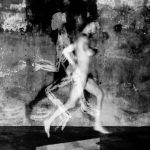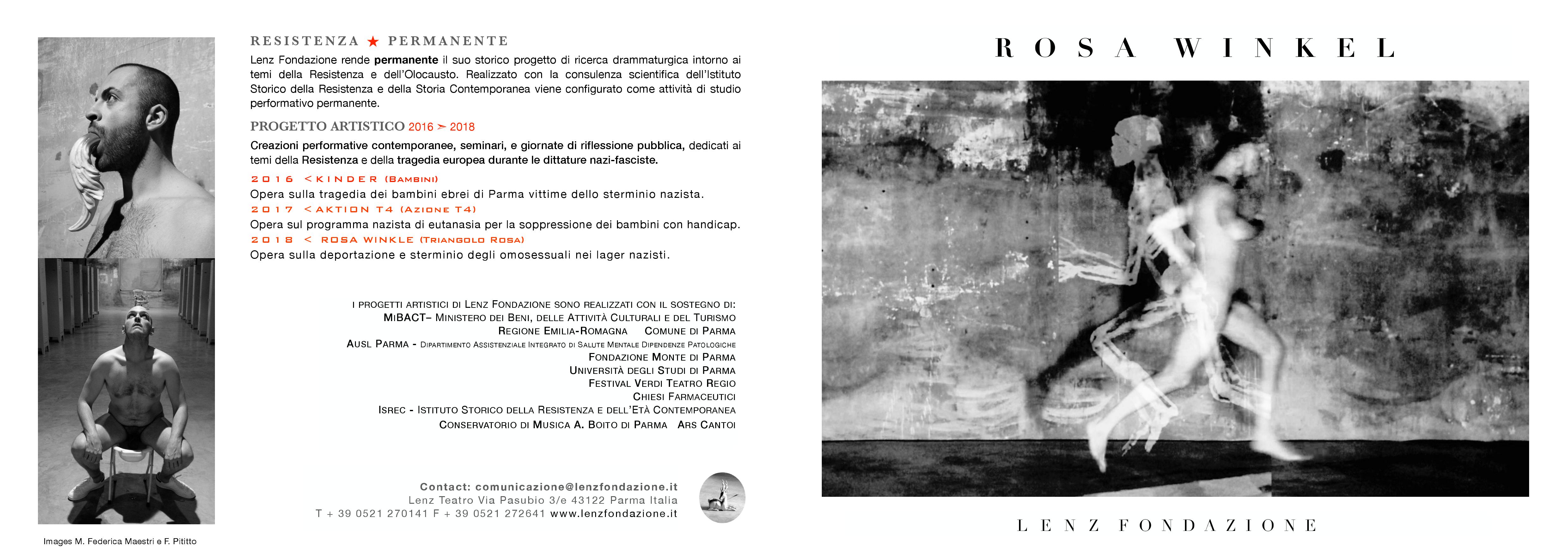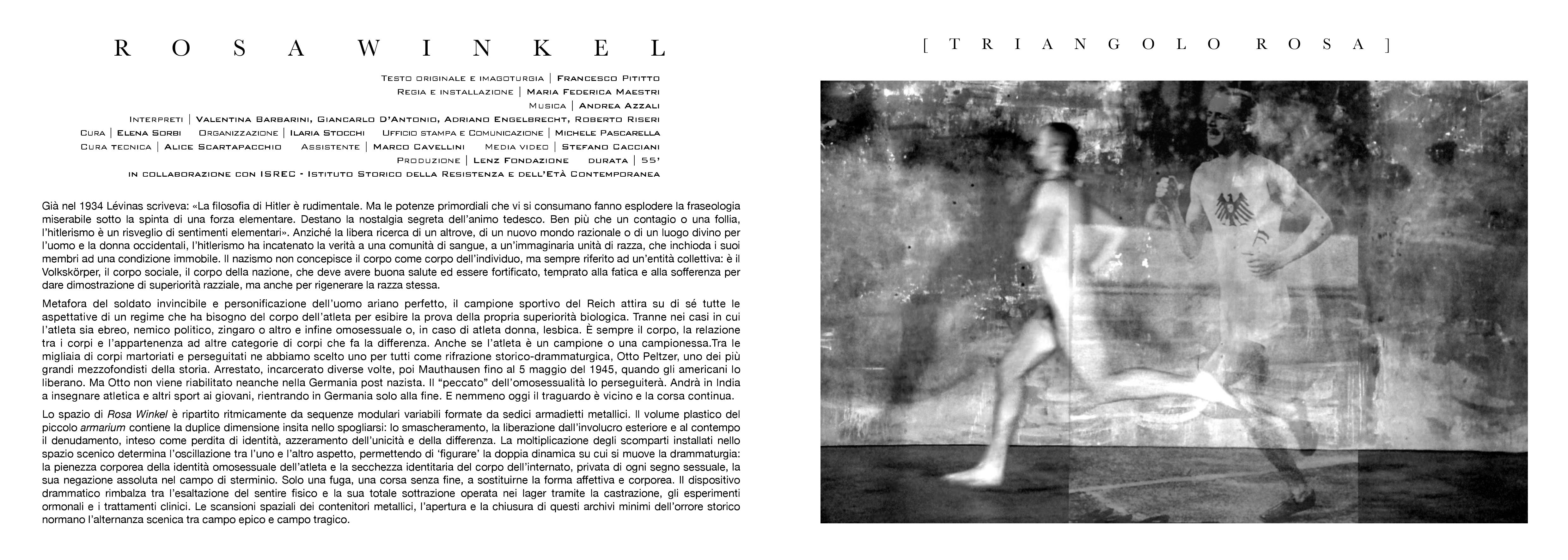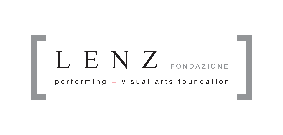
BRUNO LONGHI [BLACK]
[BLACK]
BRUNO LONGHI
Dal 2015 Lenz Foundation has made permanent its historic dramaturgical research project around the themes of the Resistance and the Holocaust. Created with the scientific advice of the historical institute of resistance and contemporary history, it is configured as a multi -year performative study activities.
In continuity with the artistic programs started in recent years Lenz Fondazione has created in the three -year period 2016-2018 A large project of contemporary performative creations, seminars, and days of public reflection, dedicated to the themes of resistance and the European tragedy during the Nazi-fascist dictatorships:
2016 KINDER (Children)
On the tragedy of the Jewish children of Parma victims of the Nazi extermination.
2017 ACTION T4
On the Nazi program of Euthanasia for the suppression of children born with malformations or disabled people.
2018 ROSA SHOP. Pink triangle
On the deportation and extermination of homosexuals in the Nazi concentration camps.
2019 [BLACK] BRUNO LONGHI
In continuity with permanent dramaturgical research on the themes of the Resistance and the Holocaust Lenz will give life to Black Bruno Longhi from the original text of Francesco Pititto on the Parmesan Partisan of which the body has never been found. Interpreters: young Nigerian women resident in Parma.
To conduct the theatrical laboratory, which provides four outcomes open to the public in April 2019, It will be Adriano Engelbrecht, Storio interpreter of Lenz productions, which thus defines the project:
“The tragic word and the narration of a tragic memory – of a historical fact, moreover, happened in our city – common cultural heritage are made. Words that belong to our history. To the history of man. It is not just the story of Bruno Longhi – Key figure of the anti -fascist resistance movement in Parma, tortured and assassinated by the SS whose body has never been found. It is also the story of a pain never dormant, generated by a brutal separation and powered by a failure and disregarded reunification. The idea of entrusting these words to a female often torn and separated by the dearest and most close affections, returns the color of a language that no longer leads back to a geographical origin, but the language of the sisters speaks, of mothers, of the young daughters. In a saline scene, bianca, The perpetual and incessant act of the burial frustrated by the absence of the body is consumed. This act is identified in the cruel ritual of useless work – often senseless, humiliating, carried out without the equipment, The necessary clothing and nourishment - in the German concentration and extermination camps. Like an hourglass that marks a precise time in a limited space, The uninterrupted construction action of a pile/mountain of salt while another and vice versa demolishes, And then again, And then again, defines the time of the story and the return of the memory around the absent and private bodies of worthy burial. Tragic memory. "
The project will be sponsored byDepartment of participation and rights of citizens of the Municipality of Parma.
Adrian Engelbrecht < nato in Germania nel 1967 vive e lavora a Parma. Poeta, artista, musicista, attore, ha pubblicato Dittico Gotico per Cultura Duemila Editrice (1993), Lungo la vertebrata costa del cuore per I Quaderni del Battello Ebbro (2003), La piscina probatica per Fedelo’s Editrice (2006), Tristano per Lieto colle (2007). Nel dicembre 2015 è uscita, insieme alla poetessa Ilaria Drago, l’ultima raccolta poetica Ubicazione Ignota, sempre per Fedelo’s Editrice. Dal 1989 al 2003 collabora in maniera continuativa come attore, regista, musicista e formatore con Lenz Rifrazioni, partecipando come interprete a numerosi spettacoli dell’ensemble tra cui: Kirillov, le tre stesure de La Morte di Empedocle, Edipo il Tiranno, Antigone, K***, La marchesa von O*, Anfitrione, Catharina di Heilbronn, La Famiglia Schroffenstein, Faust I, Cenerentola, Cappuccetto Rosso e curando la regia di opere tra cui: Riccardo II e Sonetto. Conduce da molti anni un articolato percorso di ricerca sul rapporto tra poesia, arte e teatro. L’ultima produzione poetica si è specificata anche nella forma installativa/espositiva e sonora indagando il rapporto tra parola, segno visivo e composizione musicale. Il suo lavoro è stato presentato in numerosi teatri, musei, gallerie e festival, sia in Italia che all’estero, tra cui il Festival Internazionale della Poesia di Genova, Parmapoesia Festival, Ricercare di Reggio Emilia, Ermo Colle, festival Natura Dèi Teatri. Nel 2014 riprende la collaborazione artistica con Lenz Fondazione che lo vede impegnato come interprete nel progetto dedicato all’Hyperion di Friedrich Hölderlin e in Rosa Winkel (Triangolo rosa) nel progetto Resistenza/Olocausto.
[/tab]
[tab title="Credits"]
[BLACK]
BRUNO LONGHI
In collaboration with ISREC
Text | Francesco Pititto
Regia | Adrian Engelbrecht
Interpreters | Young Nigerian women residing in Parma
Musica | Andrew Azzali
Treatment | Elena Sorbi
Organization | Ilaria Stocchi
Press and communication office | Michele Pascarella
Technical care | Alice Scartapacchio
Production | Lenz Foundation
Text











